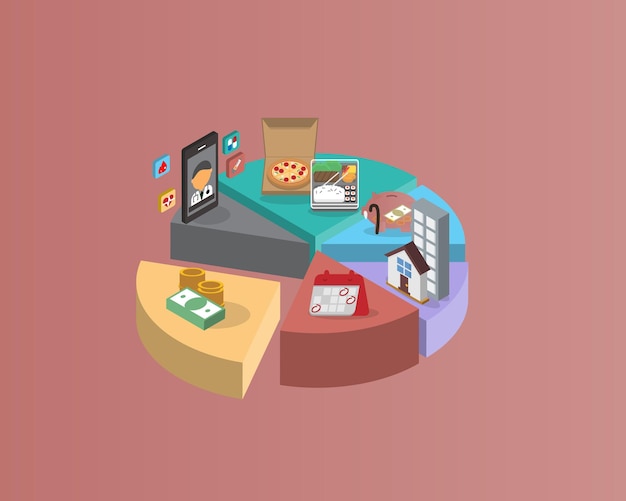Cut Costs Now: Personal Finance Tips for Eliminating Unnecessary Expenses

Cutting unnecessary expenses is crucial for improving your financial health; this involves identifying and reducing non-essential spending through budgeting, mindful consumption, and finding cost-effective alternatives to everyday expenses.
Are you looking to boost your savings and achieve your financial goals faster? One of the most effective strategies is cutting unnecessary expenses. Let’s explore how you can easily identify and eliminate these costs, putting more money back in your pocket.
Understand Your Spending Habits
Before you can start cutting expenses, it’s essential to understand where your money is going. Many people are surprised when they actually track their spending and see how much they’re losing on things they don’t really need.
Track Your Expenses
The first step is to track every dollar you spend. There are several ways to do this, from using simple notebooks to sophisticated apps.
- Budgeting Apps: Apps like Mint, YNAB (You Need A Budget), and Personal Capital can link to your bank accounts and automatically track your expenses.
- Spreadsheets: Create a spreadsheet in Google Sheets or Excel to manually record your spending.
- Notebook: Keep a small notebook with you and jot down every purchase you make.
Categorize Your Spending
Once you’ve tracked your expenses for a month, categorize them to see where your money is going. Common categories include housing, transportation, food, entertainment, and personal care.

Understanding your spending habits allows you to pinpoint exactly where you’re overspending, making it easier to identify areas for potential cuts.
Identify Non-Essential Expenses
Now that you have a clear picture of your spending, it’s time to identify non-essential expenses. These are the things you can live without or find cheaper alternatives for.
Classify “Wants” vs. “Needs”
Distinguishing between your wants and needs is crucial. Needs are essential for survival and well-being, while wants are luxuries that add comfort or pleasure.
- Needs: Housing, food, transportation to work, healthcare.
- Wants: Dining out, cable TV, premium coffee, new clothes.
Review Subscriptions and Memberships
Subscriptions and memberships can quickly add up. Review all of your subscriptions and cancel the ones you don’t use regularly.
- Streaming Services: Netflix, Hulu, Spotify, etc.
- Gym Memberships: Do you actually go to the gym regularly?
- Magazines and Newspapers: Can you read these online for free?
Identifying and cutting non-essential expenses requires an honest assessment of your lifestyle and priorities, ensuring you’re only paying for things that truly add value to your life.
Create a Budget and Stick to It
A budget is a roadmap for your money, guiding you on how to spend, save, and invest. Creating a budget is essential for controlling your finances and cutting unnecessary expenses.
Choose a Budgeting Method
There are several budgeting methods to choose from, each with its own advantages.
- 50/30/20 Rule: Allocate 50% of your income to needs, 30% to wants, and 20% to savings and debt repayment.
- Zero-Based Budget: Allocate every dollar of your income to a specific purpose, ensuring that your income minus your expenses equals zero.
- Envelope System: Use cash for variable expenses like food and entertainment, putting a set amount in envelopes each month.
Set Realistic Spending Limits
When creating your budget, set realistic spending limits for each category. Be honest with yourself about how much you can realistically cut back.
Creating a budget and sticking to it provides a structured approach to managing your money, helping you prioritize spending and eliminate unnecessary costs effectively.
Reduce Food Costs
Food is often one of the biggest expenses in a household budget. Reducing food costs can free up a significant amount of money for savings or other financial goals.
Plan Your Meals
Meal planning can save you time and money by reducing impulse purchases and food waste.
Plan your meals for the week ahead, taking inventory of what you already have and making a shopping list based on your meal plan. Stick to your shopping list when you go to the store.
Cook at Home More Often
Eating out is almost always more expensive than cooking at home. Make an effort to cook at home more often, even if it’s just a few extra meals per week.

Reducing food costs through meal planning and cooking at home can significantly lower your monthly expenses while promoting healthier eating habits.
Lower Transportation Expenses
Transportation costs can include car payments, gas, insurance, and public transportation fares. Finding ways to lower these expenses can result in substantial savings.
Use Public Transportation or Bike
If possible, use public transportation, bike, or walk instead of driving. This not only saves money but also reduces your carbon footprint.
Carpool
Carpooling with coworkers or friends can significantly reduce your gas and parking expenses.
Maintain Your Vehicle
Regular maintenance can prevent costly repairs and prolong the life of your vehicle. Keep up with oil changes, tire rotations, and other recommended maintenance tasks.
Lowering transportation expenses through alternative commuting methods and vehicle maintenance can lead to considerable savings and a reduced environmental impact.
Find Free or Low-Cost Entertainment
Entertainment doesn’t have to be expensive. There are many free or low-cost ways to have fun and relax.
Take Advantage of Free Events
Many cities offer free events, such as concerts, festivals, and movie screenings. Check local listings for upcoming events.
Visit Parks and Museums
Parks and museums often have low or no admission fees. Pack a picnic and spend the day outdoors.
Host Game Nights or Potlucks
Instead of going out, host game nights or potlucks with friends. This is a fun and affordable way to socialize.
Finding free or low-cost entertainment options allows you to enjoy your leisure time without breaking the bank, promoting a balanced and fulfilling lifestyle.
Negotiate Bills and Shop Around
Many bills are negotiable, and it’s always worth shopping around for better rates on insurance, internet, and other services.
Contact Service Providers
Call your service providers and ask if they have any promotions or discounts available. Let them know you’re considering switching to a competitor.
Compare Insurance Rates
Shop around for better rates on car, home, and health insurance. Compare quotes from multiple companies.
Cancel Unused Services
If you’re not using a service, cancel it. Don’t pay for things you don’t need.
Negotiating bills and shopping around ensures you’re getting the best possible rates, saving you money on essential services and reducing overall expenses.
| Key Point | Brief Description |
|---|---|
| 📊 Track Spending | Monitor expenses to identify where your money is going. |
| ✂️ Cut Subscriptions | Cancel unused streaming, gym, and other memberships. |
| 🍳 Cook More | Plan meals and cook at home to reduce dining out costs. |
| 🚌 Use Public Transport | Opt for buses, bikes, or carpooling to save on transportation. |
FAQ
▼
Tracking your spending helps unveil where your money goes, revealing areas for potential savings that you might otherwise overlook.
▼
Plan your meals ahead, create a shopping list and stick to it, avoid impulse buying, and cook at home more often to minimize expenses.
▼
Enjoy free local events, visit parks, museums, and libraries, or host game nights at home to entertain yourself and friends without spending much.
▼
Review your budget at least once a month to make sure you’re staying on track, identify any new unnecessary expenses, and adjust as needed.
▼
Yes, many bills can be negotiated. Contact your service providers to inquire about available discounts or consider switching to save money on essential services.
Conclusion
Cutting unnecessary expenses is a straightforward yet powerful way to improve your financial health. By understanding your spending habits, setting a budget, and making conscious choices about where your money goes, you can free up funds to achieve your financial goals, whether it’s paying off debt, saving for a down payment, or investing for the future.